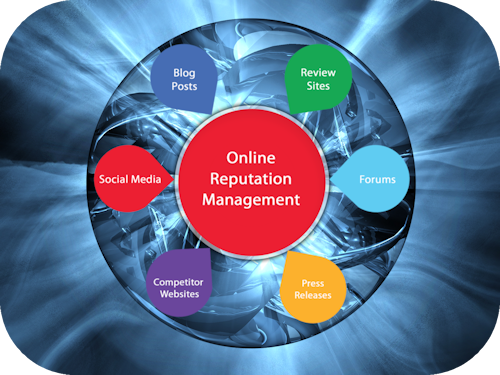
Online Reputation Management
By Charles Moffat - February 2016.
Sadly many celebrities and politicians could benefit from the list below, and likely would benefit from having a handler telling them when to be quiet and not put their foot in their mouth.
But for those of us who don't have foot-in-mouth disease, we are rarely rocked by scandals and rarely pay much attention to how the public views our persona - socially or online. However when it comes to companies looking to stay on top of a bad situation, or individuals who either did something they now regret or have been the target of online defamation, then they really need to learn how to manage their online reputation.
Wealthy individuals with expensive lawyers will often try to impose their will on others by simply sending a cease and desist letter to any website owner or blogger they wish to intimidate and pressure into removing any content that they feel hurts their reputation. That *sometimes* works, the trick is that the website's server has to be operating in the same country and they have to know who the owner of the content is. If the website is operating overseas, and the person who is posting the content is anonymous, then that suddenly makes it much more difficult. Websites hosted in Asia, the Middle East, Africa, Russia and Australia for example won't automatically be shut down or intimidated by someone whose lawyer is in Toronto, Canada.
Another problem is what happens when there is multiple copies of the same information? There could be five copies, fifty copies, five hundred copies or even five thousand copies. Is a person going to get their lawyer to send cease and desist letters to every single website owner for 5000 different websites? Nope. Five maybe. Fifty, doubtful unless the individual is a billionaire. And even if they do send that many cease and desist letters, where is the guarantee that the website owners will be intimidated and bullied into removing the content? There isn't one.
Even if they received a court order (from the correct) country demanding the content be removed, the website owners could simply move the content to a server in South Korea or Vietnam or Russia. In the case of the website badboyreport.com, the website was shut down in the USA with a court order, but the reopened the website in South Korea and has been operating overseas ever since as badboyreport.kr. Fortunately some countries have now blocked that domain name due to the numerous lawsuits involving that one particular website. As of checking the website on February 23rd I saw a 403 Forbidden code, indicating that the website is no longer allowed to be seen in Canada. A 403 code is not an error. It is the government telling you that website has been banned due to legal reasons.
However don't expect the Canadian government to ban every website simply because it says something bad about you, especially if what it is saying is either: True, or Reasonable to Believe. If it is Reasonable to Believe, then it is not technically defamation. So suing every website that says something that is either True or Reasonable to Believe isn't going to help your reputation.

So what can you do instead?
This is where Online Reputation Management comes in. It is similar to Search Engine Optimization in the context that you are attempting to manipulate what comes up in search results, which in this case is to create enough Positive Buzz online that it counteracts Negative Buzz. Spend enough time creating Positive Buzz and you can flood the search results with keywords about a person or company that people searching for those keywords will only see positive results about the person or company in question.
Many people on a budget will likely try to do this themselves, and won't have a clue what they are doing and make lots of mistakes. For those who can afford to hire someone to do it for them, I recommend that they contact us to make an in-person meeting to discuss their options.
We should note that Online Reputation Management can be either relatively inexpensive or it can be quite expensive. It really depends on how much damage has been done to someone's reputation and how much Positive Buzz will be required to fix the problem. Some problems might not be something that can be fixed. eg. If your name is "Paul Bernardo" you are probably better off just legally changing your name. But if it is a simple matter of one or two people badmouthing you online, well we can bury what those people are saying underneath so much Positive Buzz with high page ranks, quality content, labelled photos, inspiring quotes, positive testimonials, good deeds you or your company has done, etc that anyone who is badmouthing you or your company might as well just give up.
There are many ways people can badmouth you or your company too.
Blog Posts or Comments on 3rd Party Blogs
Competitor Websites
Comments on Newspaper Websites
Forums
Newsletters / Newsletter Archives
Press Releases to News Organizations
Review Websites
Social Media Websites like Facebook / Twitter
Don't let naysayers control your reputation. You can't control how much Negative Buzz people say about you, but you can control how much Positive Buzz people see when they Google your name. Contact designSEO.ca to begin the process of controlling your online reputation.
Five Tips for DIY Reputation Management
#1. Take control of any Social Media accounts you own or should own. eg. Facebook, Twitter, YouTube, etc. If anyone on those websites is posting things pretending to be you, complain to the site in question and take control of those accounts. It is a simple matter of informing them that someone is impersonating you and that you want that account to be either deleted or for yourself to take control of it. Large social media companies don't want to be involved in lawsuits and easily avoid such things when they can.
#2. Don't say more things that will damage your reputation even more than before by trying to defend what you previously said. Instead, start making positive comments about things that are completely separate from the controversy. eg. If you have a Twitter profile or official Facebook profile then you should make comments about the weather, cute animals, sports, etc. Avoid saying anything controversial.
#3. Do NOT make a fake account and start posting positive comments about yourself on blogs that contain negative comments about you. You are just making those websites more popular by making them change more often - Google boosts websites up the rankings faster if they change regularly. Instead your goal should be to make new websites that say positive things, and then regularly update those websites so that Google knows the website in question is active and deserves to be boosted up the rankings.
#4. Keep all of your official websites family friendly. Avoid any swear words or derogatory language. Why? Because Google filters out pages with adult content so too many swear words makes your website for adults only, which means it will be filtered from most search results.
#5. Set a goal of having all top ten search results being Positive Buzz or at least reputation neutral. For very famous people or big corporations, this will be almost impossible to do. For large corporations have all top ten search results being positive it shows that they are likely making lots more money because their reputation is so stellar. But for Torontonians with really bad reputations (Rob Ford, Jian Ghomeshi, etc) they might as well give up now. For anyone who isn't "famous" then they at least stand a chance of controlling their online reputation so that other people aren't doing it for them.
"You don't fight fire with fire. You douse it with water and watch the coals simmer down until nothing remains."
Why is Online Reputation Management so Important for Online Businesses?
June 2023.
Online Reputation Management (ORM) is the practice of monitoring, influencing, and maintaining the reputation of a brand or individual on the internet. In today's digital landscape, where information spreads rapidly and opinions are easily shared, ORM has become increasingly important for online businesses. Here are several key reasons why ORM is crucial for online businesses:
Building Trust and Credibility: A positive online reputation helps build trust and credibility among potential customers. When people search for a business online, they often rely on reviews, ratings, and other online information to form an opinion. A strong online reputation with positive customer reviews, testimonials, and a favorable brand image instills confidence in potential customers, increasing the likelihood of conversion.
Influencing Customer Perception: Online reputation directly influences how customers perceive a business. Negative reviews or damaging content can harm a brand's image and deter potential customers. By actively managing online reviews, addressing customer concerns, and showcasing positive feedback, businesses can shape the perception of their brand, emphasizing its strengths and mitigating any negative sentiment.
Competitive Advantage: In a crowded online marketplace, a positive reputation sets a business apart from competitors. Customers are more likely to choose a brand with a solid reputation over others that have negative reviews or limited online presence. A strong online reputation can give businesses a competitive edge, attracting more customers and driving growth.
Increased Customer Engagement and Loyalty: By actively monitoring and responding to online feedback, businesses demonstrate their commitment to customer satisfaction. Engaging with customers, acknowledging their feedback, and resolving issues promptly can enhance customer loyalty. Satisfied customers are more likely to become repeat customers and advocates who promote the brand through positive word-of-mouth.
Better Search Engine Rankings: Online reputation influences search engine rankings. Search engines consider various factors, including the overall sentiment and relevance of online content, when determining search result rankings. A positive online reputation, supported by positive reviews, relevant content, and authoritative backlinks, can contribute to higher search engine rankings, increasing visibility and organic traffic.
Crisis Management and Damage Control: No business is immune to occasional negative feedback or public relations crises. Having a proactive ORM strategy in place enables businesses to effectively manage and mitigate potential reputational damage. By promptly addressing issues, providing transparent communication, and taking necessary corrective actions, businesses can minimize the impact of negative incidents on their reputation.
Recruitment and Partnerships: A positive online reputation is not only crucial for attracting customers but also for attracting top talent and forging partnerships. Job seekers often research a company's reputation before applying, and potential business partners consider a company's online reputation as part of their due diligence. A strong online reputation enhances a business's ability to attract skilled employees and establish collaborative relationships.
In summary, Online Reputation Management plays a vital role in shaping how a business is perceived online. By actively monitoring and managing their online reputation, businesses can build trust, credibility, and customer loyalty, gain a competitive advantage, improve search engine rankings, and navigate potential crises effectively. Investing in ORM is essential for online businesses to safeguard their brand image, attract customers, and drive long-term success in the digital landscape.


